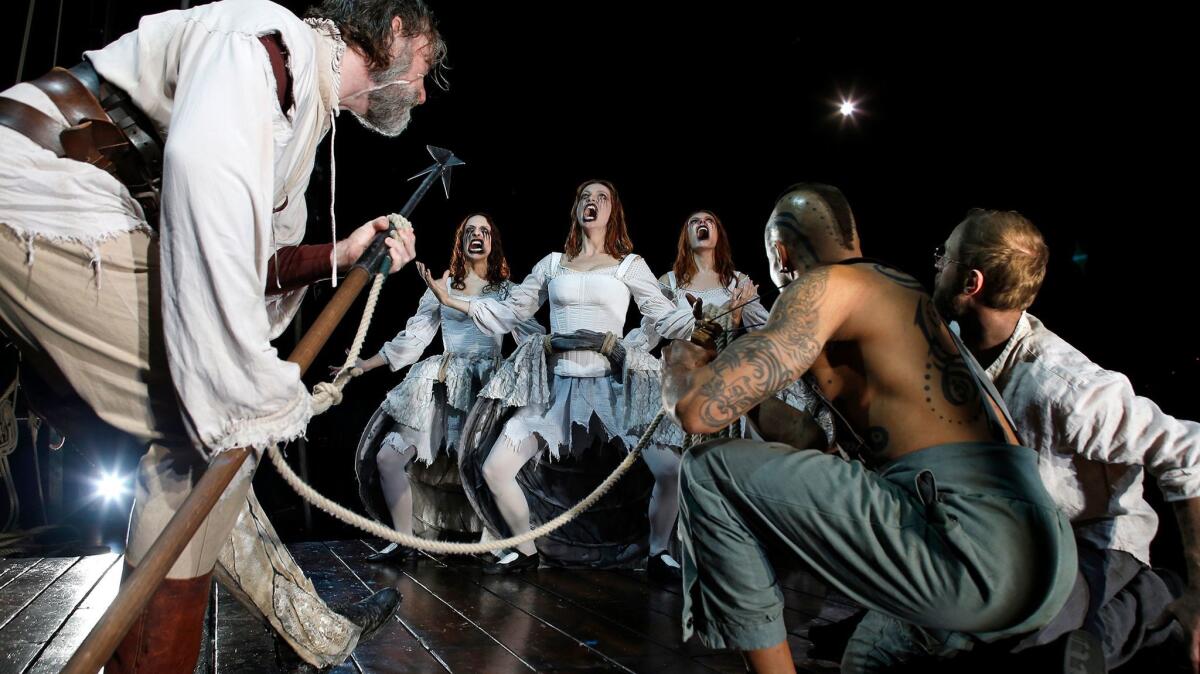Critic’s Choice: At South Coast Rep, a stunning, gravity-defying stab at ‘Moby Dick’
- Share via
There’s no avoiding politics these days. Not even a thrilling stage adaptation of the great American novel set on the high seas can offer complete escape.
At Saturday’s matinee of “Moby Dick” at South Coast Repertory, when Starbuck, the levelheaded first mate on the Pequod, asked about Captain Ahab, “Shall this crazed old man be tamely suffered to drag a whole ship’s company down to doom?” it seemed as if the audience collectively drew a loud intake of breath. (If Starbuck were to tweet this question today, he’d no doubt gain 10,000 followers in an instant.)
Of course Herman Melville’s classic novel, published in 1851, isn’t about this latest turn in American democracy. But its scope is so wide, ranging across subjects of morality, metaphysics and even marine biology, it can’t help speaking eloquently to our current turmoil. A voyage into the heart of darkness, “Moby Dick” is still the most incisive guide to the lure of destruction that threatens to capsize all that our civilization has built up in its defense.
The production, adapted and directed by David Catlin, comes from Chicago’s Lookingglass Theatre Company. A marvel of economy, the adaptation shrinks a 500-plus-page novel into two hours of stage time.
Naturally, something is lost in translation. The great, mad Swedish playwright August Strindberg lamented that the 19th century theater had become “a Bible in picture for those who cannot read what is written or printed.” He would be right to note that the attenuated stage version cannot induce the same sea change of consciousness as a full immersion into Melville’s hypnotic prose.
But Strindberg would no doubt be mightily impressed by the impressionistic approach to theatrical illustration. Visually, the production is a stunner. Catlin and his brilliant design team provide scenic enticement to awaken the audience’s imagination. Like the best books, the staging (with sets by Courtney O’Neill, costumes by Sully Ratke and lighting by William C. Kirkham) requires our full mental collaboration.
The vessel captained by Ahab discreetly suggests the skeletal outline of a great white whale. Like Jonah, whose biblical tale is invoked by Melville, we are in the belly of the beast.
But we’re also encouraged to float above the action through the acrobatic dynamism of the actors who leap onto ropes and hoops that double as the ship’s mast. Sylvia Hernandez-DiStasi is responsible for the aerial choreography, which infuses the staging with kinetic excitement.

Three actresses (Kelley Abell, Cordelia Dewdney and Kasey Foster) portray what the program describes as the Fates. These otherworldly figures intone descriptive passages from Melville that capture the addictive nature of the sailor’s life. Sound designer and composer Rick Sims provides music for these female apparitions that evokes the death-haunted nature of the open seas, ingeniously conjured by a billowing skirt.
“Call me Ishmael” is how both the novel and this untraditionally traditional stage version begin. The role is performed by Jamie Abelson, who plays Ishmael as a persnickety loner who sees the sea as the only answer to the gloom that has engulfed him. He is our eyewitness on this journey and, in those few moments when he transcends his limitations, he becomes our emotional surrogate.
The characterizations may not have sufficient time for psychological complexity, but they have a vivid flatness that hints at greater depths. The evolving friendship between Queequeg (a muscularly graceful Anthony Flemming III), the Polynesian harpooner, and Ishmael grows in poignancy as Ishmael comes to emotionally depend on the “cannibal” who turns out to be in many respects the most highly evolved person aboard the whaling ship.
Christopher Donahue limns Ahab’s monomaniacal soul with an austere economy of brushstrokes. This is no melodramatic stage villain but a plausible leader who has given himself over to vengeance. Ahab’s pursuit of Moby Dick, the great white whale that caused the loss of his leg, has become for him the substitute religion that no reason can deter.
Opposing him is Walter Owen Briggs’ Starbuck, a professional and practical-minded sailor who recognizes the dangers of Ahab’s obsession yet struggles to find the will to overcome him. Briggs’ performance offers sharp glimpses into the character’s inner struggle to overturn hierarchy and convention when the lives of his shipmates are on the line.
Lookingglass’ buoyant staging honors a literary masterpiece by stretching the company’s theatrical vocabulary almost to the breaking point. Great works of art defy safety, and there’s a scene near the end when I feared that not just the crew of the Pequod but also the audience at South Coast Rep was in imminent danger.
While serving as an inspiring example of physical theater, the production complements rather than replaces the novel. The experience revived in me the memory of reading “Moby Dick” one summer as a young man on vacation near the shore and it has urged me to take the book down from the shelf to reacquaint myself with a narrative wisdom that is never out of season.
------------
‘Moby Dick’
Where: South Coast Repertory, 655 Town Center Drive, Costa Mesa
When: 7:30 p.m. Tuesdays-Wednesdays, 8 p.m. Thursdays-Fridays, 2:30 and 8 p.m. Saturdays, 2:30 and 7:30 p.m. Sundays; ends Feb. 19
Tickets: $30-$84
Information: (714) 708-5555 or www.scr.org
Running time: 2 hours, 15 minutes
SIGN UP for the free Essential Arts & Culture newsletter »
Follow me @charlesmcnulty
ALSO
‘The Bitter Game’: Personalizing the Black Lives Matter movement through theater
Abducting Mozart’s ‘Abduction From the Seraglio’ to another time
Nightclub shooting in virtual reality? For Rose Troche, painful subjects make for powerful art
More to Read
The biggest entertainment stories
Get our big stories about Hollywood, film, television, music, arts, culture and more right in your inbox as soon as they publish.
You may occasionally receive promotional content from the Los Angeles Times.











